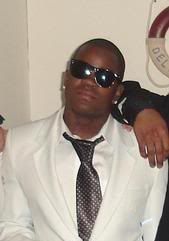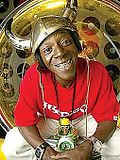A few days before November 4, 2008, I cast my vote for Barack Obama to become the first man of color to hold the office of the President of the United States of America. In voting for Obama, I was not voting for color, I was voting for change within a political system that I believed was slowly yet surely tearing down the structure of American society. With the world watching that night, I celebrated with millions of people of color around the world as Obama accepted his nomination to take upon the responsibility of such a prestigious postion. Through this monumentous moment, the men and women who have fought, and in many cases died for this opportunity watched in jubilation as their dreams of civil rights and equal opportunities for all were finally realized. For many, the election of Barack Obama was received as the end of the struggle for equality, and the final event in which men and women of color broke free from the chains of our past and took our first real step as true equal global citizens. While I agree that the election of Obama represents a moment in which people of color, specifically African-Americans, can mark as a watershed event, I firmly also believe that many of those same African-Americans have lost sight of the slow disintegration of our culture that is taking place on a daily basis.
The title of this blog was taken from the book, "The Souls of Black Folk," the influential and moving book written by W.E.B Dubois in 1903. Dubois, one of the preeminent African-American scholars of the early 20th century, sought to critique the pain and anguish, as well as the struggles for civil rights that were synonymous with the Black experience in America. In writing this book, Dubois developed a groundbreaking work that aided greatly in understanding what it meant to be African-American within a White American culture. One of DuBois most powerful arguments that is still saddeningly prevalent today are his anaysis of two significant themes-- "the veil," and "double consciousness."
The veil to DuBois is a situation in which;
"the Negro is ... born with a veil, and gifted with second-sight in this American world, --a world which yields him no true self-consciousness, but only lets him see himself through the revelation of the other world. It is a peculiar sensation, this double-consciousness, this sense of always looking at one's self through the eyes of others, of measuring one's soul by the tape of a world that looks on in amused contempt and pity. One ever feels his twoness,--an American, a Negro; two souls, two thoughts, two unreconciled strivings; two warring ideals in one dark body, whose dogged strength alone keeps it from being torn asunder." --W.E.B. Dubois, Souls of Black Folk
In other words, "the veil" respresents a commanding and discernible allegory that represents the experience of African-Americans who lived within the segregated society of a Jim Crow world in which Black men and women were exploited and disenfranchised by their exposure through menial and degrading positions. "The veil" also represents the realities of a tangible societal, emotional, and metaphysical barrier that effectively separates Blacks from the rest of the American people, through their political disenfranchisement, economic marginalization and exploitation. To Dubois, a direct parallel to the veil is the "double consciousness" that also paralyzes the advancement of African-American men and women. The double consciousness refers to a feeling of "two-ness," that is a very unique and atypical condition of the African American experience that influences both aspects of the equation, both African and American. Double consciousness is the mindfulness of one's self, as well as the awareness of how others perceive that person within that culture. The dangers of double consciousness reside from conforming and/or changing your own identity to that of how others perceive that person. These unique characteristics, when united within the realities of real people can potentially bring about a dangerous tension that can severely hinder the development of not only Black people, but also the larger American society. DuBois almost prophetically captured this sentiment over 100 years ago.
In America today, Black people, specifically men, are still struggling with the same dispositions that DuBois described in his book. During the time of Dubois, King, and Malcolm X, many Black men had a cause in which they were sympathetic too. In many ways, given the deaths of these influential men, as well as the end of the Black Power movement, the hopes and aspirations of many of these causes died with them. Sadly, today I am hard pressed to find more than a handful of Black men who are willing to rise and step forward for a cause. Instead, our culture has digressed into a society in which many of our role models are professional athletes or rappers, or in some instances infamous criminals. Many of our Black youth sympathize with the efforts of Al Pacino in 'Scarface,' the lyrics of the latest 'Lil Wayne' song, or the latest SportsCenter dunk by Lebron James. To take it a step further, the word that represents the struggle, injustice and dehumanization of every Black man and woman, is now celebrated. As a culture, we have degenerated to the point where the word that the Urban Dictionary defines as, a "slang term for homie, friend, buddy, etc.," can be heard as plentiful and common as almost any other word associated with friendship. Dr. Martin Luther King, Jr. as well as the thousands of others who fought, were beaten, and in some cases killed as this word was being spewed towards them, are disrespected every time we use this word. Jackie Robinson, who was dehumanized and disrespected by that word every time he stepped onto the baseball diamond would be appalled to hear the way that this word is used by countless individuals. To further this, the NAACP attempts to hold a mock funeral service for the word, while our culture continues to ignore the societal and cultural effects that continue to be perpetuated. Wale, a rapper from the Washington D.C metro area, understands and assesses the tension associated with this through his song, "The Kramer."
"And niggas say nigga to a nigga,
and nigga write nigga in a lyrics, expect the white boy to omit it,
the white boy spit it like he spit it,
recite it to his friends who by the way ain't niggas,
and say nigga, nigga, nigga, my favorite rapper did it,
and non-nigga friends got it with him,
Incorporate this lyrics to their everyday living,
Until a Black friend kinda hear it, just a tid bit,
He thinks Aw, forget it, it's so insignificant and little,
The White boy sees this as a clearance, now its
Nigga, nigga, nigga, every single day,
And that little nigga nigga, thinks it's okay,
And he's the only nigga in his particular grade, and it begins to phase him more each day,
The things they say went a little too far,
He couldn't tell the difference between an a or er,
So they keep going, saying nigga in his face,
There's nothing he can do, he let it get away,
It came to the point he couldn't look em in the face,
The mirror made him hurl, his reflection disgraceful,
Yeah, and make sure everything you say,
Can't be held against you in any kind of way,
And any connotationis viewed in many ways,
Cuz under every nigga, there's a little bit of Kramer,
Self-hatred...I hate you, and myself...
Niggas." Wale, The Kramer
This song is in a sense a microcosm in the way that it reflects African-American society. Just like DuBois talked about the impact of "double consciousness" and the "veil," in many ways we keep ourselves beneath this 'shield' as we continue to degrade and detract our own people. As Wale described, on one hand we say the word as a term of endearment, an affirmative 'eff you' to the establishment that responsible for the negative connotations associated with the word. On the other hand, we see the damage that the word is actually inflicting, as that same establishment now has lost insight as to the true devastation that this word caused to the unhealed wounds of those still healing. Instead of becoming inspired by the AIDS epidemic that is sweeping through the African-American community, situations of crippling economy that continues to paralyzes Americans of all colors, and countless other causes, many Black men and women continue to operate under this veil that causes them to be more concerned with when the next Day 26 song comes out, or the new graphics for Madden 2010. This, as well as a large majority of themes associated with BET and the subsequent 'hip-hop culture,' (an issue I will definitely blog about soon), and the lack of Black men and women who have taken the lead as role models, are large prevailing issues that we face that will continue to keep many African-Americans as being defined by the word that they use so freely; ignorant niggas.













